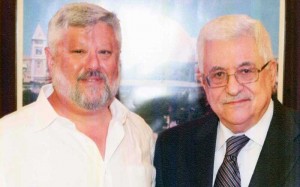In fact, Baskin declared last month that he was the one who gave the idea to European Union Foreign Policy chief Javier Solana, who said earlier this year that United Nations Security Council should recognize a Palestinian state even if there is no deal between Israel and the Palestinians.
“[Solana] heard it first from me, but it’s fine, let Solana get the credit,” Baskin said Aug. 8 in Beit Jalla, near Bethlehem, at an IPCRI conference titled “Education for Peace.”
Baskin said that under his proposed plan, the United States wouldn’t use its United Nations veto power to prevent the UN Security Council from recognizing a Palestinian state within provisional borders.
He told the conference – attended by Israelis and Palestinians – that two weeks before the conference, he met for “secret talks in the U.S.” with five Palestinians, five Americans and five Israelis about his plan.
According to Baskin’s proposal, Palestinian Authority President Mahmoud Abbas would submit a request to the Security Council asking for a state of Palestine to be granted full membership in the UN.
Without a U.S. veto, the request would likely receive the necessary nine or 15 votes within the council that it would need in order to pass.
At that point, “the state of Palestine will become a full member state obligate by the UN Charter,” Baskin said.
“At that moment, the Israeli occupation of one member state of another will require a new Security Council resolution that will supersede [Security Council resolution] resolution 242 and all other resolutions on the Israeli-Palestinian conflict.”
The proposal also says that the “main elements of the new… resolution would be the re-confirmation under international law of the ‘two states for two peoples’ solution.”
Baskin added that once this occurred, the UN could deploy international forces to implement a two-state solution, with Jerusalem as a capital for both states.
Baskin’s proposal states:
“The implementation process would have to include several elements – the resolution would state the principal that the international community is prepared to use… the [UN] Charter and to deploy international forces (military, police, and civilian) to supervise the Israeli withdrawal from Palestine.”
In addition to putting forth this proposal to Solana, Baskin told the conference that he has presented his plan to the Americans.
When asked specifically whom the plan was sent to, Baskin said it was presented to two deputy secretaries of state and the office of the U.S. special envoy to the Middle East, George Mitchell.
He said that in the first week of August, he also met Rafik Husseini, Abbas’ chief of staff, and gave him the plan to present to the PA president, adding that he expected it to have been given to Abbas after Fatah’s recent convention in Bethlehem.
A June 13 article in Ha’aretz reported that while in London, Solana said that “after a fixed deadline, a UN Security Council resolution should proclaim the adoption of the two-state solution.”
Solana also reportedly said that the UN “would accept the Palestinian state as a full member of the UN and set a calendar for implementation.”
Baskin told the conference that Solana made his comments without first notifying Mitchell, suggesting that they were intended as “a trial balloon.”
Baskin’s plan can be viewed on IPCRI’s website at www.ipcri.org/files/ending.pdf.
In an abstract of his talk, Baskin said that, in his view, “there will not be any successful bilateral Israeli-Palestinian negotiations at any time in the near future.”
He argued that once the United States and the UN take steps to recognize a Palestinian state, the peace camp in Israel will be able to rally around it and be revived.
Asked whether the Canadian government funds IPCRI, Rodney Moore, a spokesperson for the Ministry of Foreign Affairs and National Trade in Ottawa responded by e-mail that the “the government of Canada supports IPCRI discussions through funding with the Network for Peace Fund of the Canadian International Development Agency. This is the one current project that Canada is supporting with the IPCRI. The government… is not affiliated with the selection of discussion topics, but supports the overall objective of Israeli-Palestinian dialogue, including through IPCRI.”
Contacted for further comment, a PMO spokesperson gave the same response.
In an interview with The CJN, Israel’s deputy foreign minister, Danny Ayalon called Baskin’s proposal “nonsense” adding that “the United States will not impose a solution on Israel, let alone the United Nations.”
Benny Begin, a Likud MK and minister without portfolio in Prime Minister Benjamin Netanyahu’s government, called Baskin’s plan “strange and queer.”
“If Canada is funding Baskin, I imagine that they don’t realize what he has been proposing [or doing]. I can hardly imagine that the Canadian government, a country that is friendly to Israel, would be supporting this, if they knew.”


